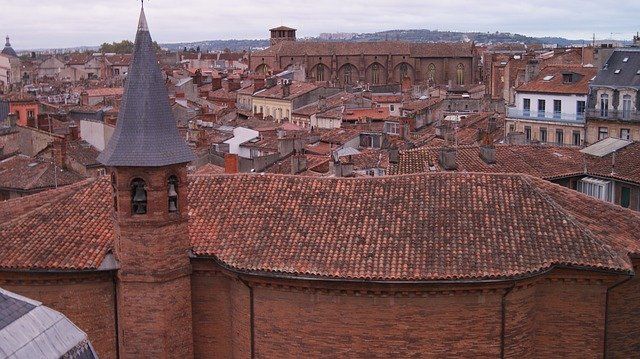Southwest France, from the Poitou down to the Pyrenees, was well on its way to becoming a Protestant area at the beginning of the seventeenth century. Two hundred Protestant churches had survived the religious wars of the sixteenth century (wars that had been particularly brutal in the south-west). Academies for the training of Protestant pastors had been set up in Saumur, La Rochelle and Mountauban.
However, in 1685, the repeal of the Edict of Nantes (which promised freedom of religion to Protestants) reversed this trend and eventually led to many Protestants emigrating. Most of their churches subsequently disappeared.
Older pockets of Protestantism, established in the early sixteenth century, managed to survive — in the Dordogne, La Rochelle, Castres, Mazamet, Toulouse, Bordeaux and the Pyrenees, particularly near the Atlantic.

Deviations
During the following centuries, the theology inherited by the Protestant churches from the Reformers was weakened by doctrinal deviations emanating from the Academy of Saumur. Later, the rise in anticlerical sentiment (which found crueller expression in the excesses of the French Revolution) was demonstrated by the warm welcome given to J. N. Darby in 1840. Darby’s exclusive brand of Brethrenism had more influence in Switzerland and southern France than in his home country of Britain.
During the twentieth century, Pentecostalism spread rapidly in France, as it did in other European countries. Southern Pentecostalism is noisier and more exuberant than that of northern Europe!
Although the number of practising Roman Catholics in France is diminishing, the general influence of Roman Catholicism still prevails throughout French society. Some practise Catholicism in a conscientious manner, with firm convictions, but many others hold it only subconsciously, mixing it in with superstition and pagan traditions.
The Charismatic movement has received a warm welcome in Roman Catholic circles. It has led, initially at least, to an increase in Bible reading among Catholics and the formation of joint Bible study groups with Protestants.
This has been an interesting development, because a Catholic does not normally feel a need to read the Scriptures to discover the truth — he is confident that his church already dispenses that commodity! If the Bible contradicts the church, the Catholic normally resolves that conflict by submitting to his ecclesiastical superiors.
Temperament
South-western Frenchmen clearly manifest their Mediterranean temperament. They also esteem their culture superior to any other. The fact that France attracts more tourists each year than any other European country confirms this point to them!
French individualism is well known. It is an individualism strengthened by the region’s past association with dissident and immigrant groups. These dissidents have included the Cathars of the Middle Ages, sixteenth-century Protestants, and prominent leaders of the French Revolution.
The twentieth century saw an influx of communists fleeing Franco’s Spain, as well as invasion by Germans and the Nazi occupation. These were followed during the 1960s by the pied noir (descendants of French families who had colonised Algeria in the mid-nineteenth century) and other Algerians.
Today’s latest arrivals are northern Europeans, who have come seeking sunshine, evading taxes, and attracted by generous family allowances and the French way of life.
Training
The twenty-three counties of south-western France are served by about two hundred Evangelical pastors. Half of these pastors are Pentecostals (mainly from the Assemblies of God denomination). Many of the people they minister to live near Bordeaux and Toulouse. The other, rural, counties have perhaps four or five pastors each. The latter pastors may serve three or four preaching stations.
French Evangelical churches have lost much of their Reformation heritage. Thirty years ago their doctrinal position was even worse than today, but improved theological training offered by the two Evangelical faculties of Aix-en-Provence and Vaux-sur-Seine, together with the increased availability of sound literature, have provided some churches with well-equipped ministers. There are now seventeen graduates from the Aix seminary serving churches here, and a few from the Vaux seminary ministering in Baptist churches.
Smallness
Many of our problems rise from the smallness of the Evangelical cause in France. Waves that would only rock a boat briefly in other countries can provoke immediate shipwreck here.
Not all the dangers come from outside. Smallness brings a wrong kind of dependence on others. A large proportion of Evangelical pastors have come from abroad and in many cases have brought with them their denominational outlook and associated doctrines, methods and literature. These influences tend to fragment an already small Evangelical population.
Smallness brings another temptation — to dilute the gospel message and collaborate with those who have not submitted to God’s truth. Today, the Roman Catholic Church is eager to obey Jean-Paul II’s appeal for ‘ecumenism’, and work together with recognised Protestant groups.
Danger of compromise
There are many temptations to compromise. We recently received from Mazamet, an historic Protestant area 60 km north of Carcassonne, an invitation to a ‘show’ given by a troupe from Marseilles. This event is organised by three Protestant churches (Reformed, Pentecostal and Independent) along with the Salvation Army and local Roman Catholic parish.
Perhaps the worst problem arising from smallness is a ‘wear and tear’ effect on faithful believers. Scripture and church history remind us that the long struggles of a faithful few can easily be followed by grievous compromise, if vigilance fails momentarily. Noah, Abraham, Moses and David provide examples of this. Their uncharacteristic lapses reinforce Paul’s warning to us: ‘Let him that thinketh he standeth take heed lest he fall’. Brethren, pray for the French churches!






